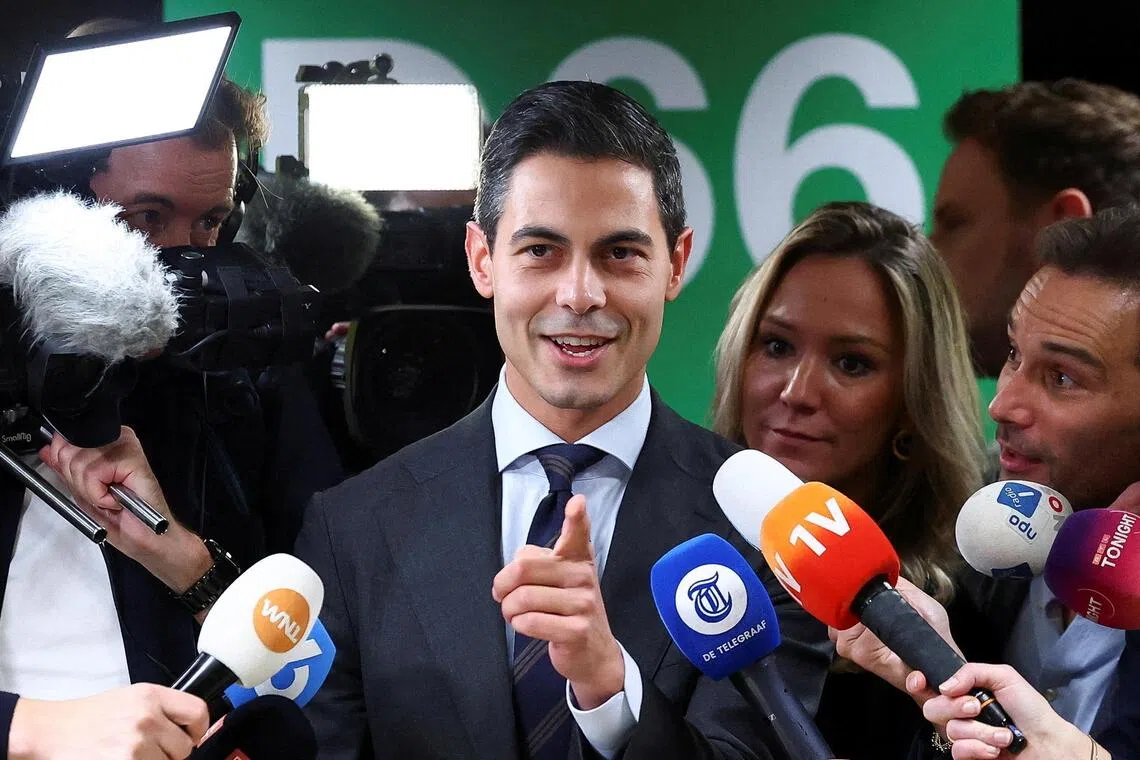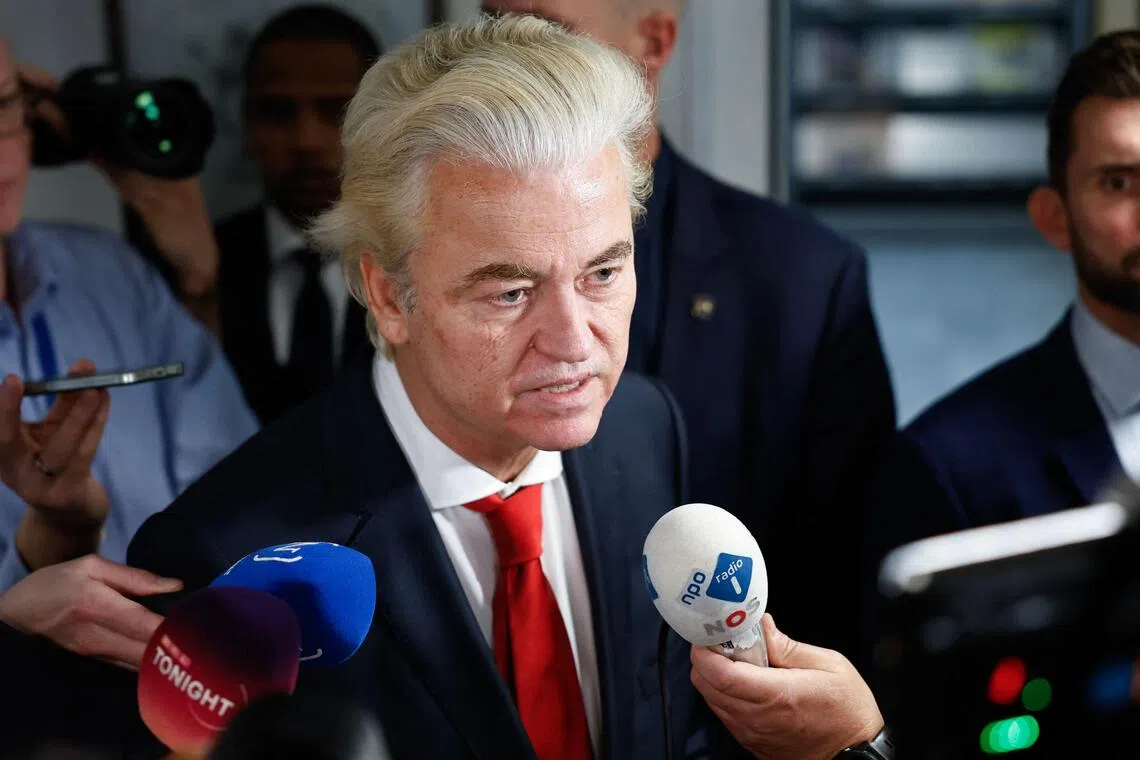‘Populists can be beaten’: Dutch centrist Rob Jetten claims election win
Sign up now: Get ST's newsletters delivered to your inbox

D66 party leader Rob Jetten is on track to become the youngest and first openly gay prime minister of the Netherlands.
PHOTO: REUTERS
- Rob Jetten claimed victory in the Dutch election, narrowly defeating Geert Wilders. Jetten stated, "it is possible to beat the populist movements".
- D66 and PVV are projected to secure around 26 seats each. Forming a coalition will be complex.
- Despite Wilders' setback, far-right parties like FvD and JA21 gained seats. Jetten aims for cooperation, but challenges remain.
AI generated
AMSTERDAM – Dutch centrist leader Rob Jetten on Oct 31 claimed victory in a knife-edge election over far-right head Geert Wilders, saying his surprise success showed populist movements could be beaten in Europe.
The 38-year-old head of the Democrats 66 (D66) centrist party is now on track to become the youngest and first openly gay prime minister of the European Union’s fifth-largest economy.
With far-right parties on the march in France, Germany and Britain, the Dutch vote was seen as a bellwether for the strength of populists in Europe.
Mr Jetten told AFP his positive message of optimism had convinced the Dutch electorate and delivered victory over the anti-Islam, anti-immigration Mr Wilders.
“I think we’ve now shown to the rest of Europe and the world that it is possible to beat the populist movements if you campaign with a positive message for your country.”
Dutch news agency ANP, which collates and distributes the vote tally, called the cliffhanger election for Mr Jetten, saying he could not be overhauled.
With the final constituency result arriving on the evening of Oct 31, only the overseas postal votes are still to be counted.
Expatriates have historically broken for more centrist and left-wing parties. At the last election in 2023, D66 outscored the Freedom Party (PVV) by nearly 3,000 postal votes.
Razor-thin lead
As things stand, Mr Jetten holds a razor-thin lead of 14,081 votes over Mr Wilders and his PVV. The D66 and PVV are each expected to get about 26 seats in the 150-member Parliament.
Postal votes are already being counted in The Hague but that result will not be announced before the evening of Nov 3 at the earliest.
The results will become official only when the Dutch Electoral Council declares them on Nov 7, but Mr Jetten said there was no time to waste.
“We do not want to waste time unnecessarily because the Dutch people are asking us to get to work,” said Mr Jetten, a keen athlete who once ran as a pacemaker to Olympic champion Sifan Hassan.
Mr Wilders retorted that Mr Jetten had jumped the gun.
“The Electoral Council decides, not ANP. How arrogant not to wait,” Mr Wilders wrote on X.
“But even if D66 becomes the largest, the PVV will not let the Netherlands be dismantled by Jetten and his like, and will oppose his left-liberal mismanagement with full force from day one,” added Mr Wilders.

Far-right politician Geert Wilders (pictured) accused Dutch centrist leader Rob Jetten of jumping the gun in claiming election victory.
PHOTO: AFP
‘Hot off the press’
Now begins the complex and lengthy process of forming a coalition of like-minded parties with a majority of at least 76 seats in the 150-member Parliament.
Mr Jetten’s main path to that appears to be a form of “grand coalition” with the centre-right Christian Democratic Appeal (18 seats), the liberal People’s Party for Freedom and Democracy or VVD (22), and the left-wing Green/Labour group (20).
The D66 party currently has 26 seats but this could be bumped up to 27 when every vote is counted, potentially opening up further coalition possibilities.
Mr Jetten said he thinks “the voters have made clear with this election result that they want cooperation on the centre ground” of Dutch politics.
But there are questions about whether the VVD and Green/Labour will work together.
VVD leader Dilan Yesilgoz said before the election that an alliance with Green/Labour “would not work” and she wanted a centre-right coalition.
On Nov 3, the Green/Labour group will elect a new leader after former European Commission vice-president Frans Timmermans stepped down.
Ms Yesilgoz and Mr Timmermans are known to have a difficult relationship so a new Green/Labour leader could ease the path to a partnership.
Although Mr Wilders saw support collapse, other far-right parties performed well.
The Forum for Democracy, a nationalist party that wants to withdraw from the European Union’s Schengen system of open borders, more than doubled its vote.
It will have seven MPs in the new Parliament, from three before. Mr Wilders has ruled out working with them, finding them too extreme.
The hard-right JA21 party, which describes itself as a “conservative liberal party with a positive view of the Netherlands”, jumped from one seat to nine.
Mr Jetten said he had not yet heard from Mr Wilders, although the news of ANP’s projection was “hot off the press”.
“We both agreed yesterday it was important to take a break and wait until more clarity about this election result was available,” said Mr Jetten.
“But now, it’s clear that D66 will be the largest party.” AFP


